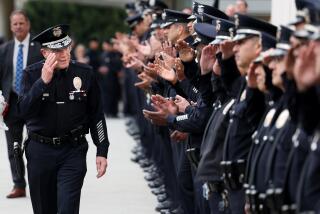The Beginning of a New Social Contract? : Police: Blacks and browns have to learn to trust the law, and cops have to understand the problems of urban communities.
- Share via
“Daryl, it is a delight to know that in this day and age of mean streets and the tough cops who patrol them, that there are still, among your officers, gentlemen.”
I wrote those words to Los Angeles Police Chief Daryl Gates on Jan. 24, barely six weeks before I called for his resignation. I still believe them.
Two LAPD officers, asked to direct an elderly woman to a public phone from which she could call for road assistance, cheerfully changed her flat tire instead and were gone almost before the woman, my mother, could call out her gratitude.
“(Those officers) could have chosen to do nothing or to do little,” my thank you note continued, “and chose instead to do all. They reflect honor and credit upon Newton Street Division, upon L.A.’s Finest and upon our city.”
When the Christopher Commission report calls for community-based policing, it is the caring of those two strangers in blue and hundreds of similar incidents I know of that makes me believe it is possible for real reform to yet take hold in our Police Department.
Minorities and police need and deserve a fresh start; if only because those who have been historically discriminated against--blacks, Latinos, Asians, immigrants, women and gays--constitute our new urban majority. The commission report can become the basis of a new social contract between members of these groups and those who have sworn “to protect and to serve” them. Do cops want to be an occupying militia, resented and distrusted even by those for whom they risk their lives? Or are they willing to be keepers of the peace, welcomed, aided, consulted, appreciated? And do we who have come to fear any contact with police want to continue being angry victims or do we want to be able to call upon them, support them and hold them justly accountable?
This isn’t a pie-in-the-sky agenda. True, there’s little trust to build on and a bitter history. But more than any others in this town, people of color and the cops dance to the same tune, “Dodging the Urban Crossfire.” The angry victims, terrorized neighbors and grieving families in besieged communities will be far more likely to cooperate with officers who they believe strive to understand the conflicts they face. Gangbanging Bloods are also blood kin. Immigrants flinch in fear when their kin are hauled away, no matter the reason.
Police don’t have to become bleeding-heart liberals to win support in South-Central or the Eastside. They do need to acknowledge that tough law enforcement will never succeed without the resources--education, employment, rehabilitation--necessary for the trapped to escape. Police jobs and inner-city lives will only become more dangerous until real help arrives.
More to Read
Sign up for Essential California
The most important California stories and recommendations in your inbox every morning.
You may occasionally receive promotional content from the Los Angeles Times.










